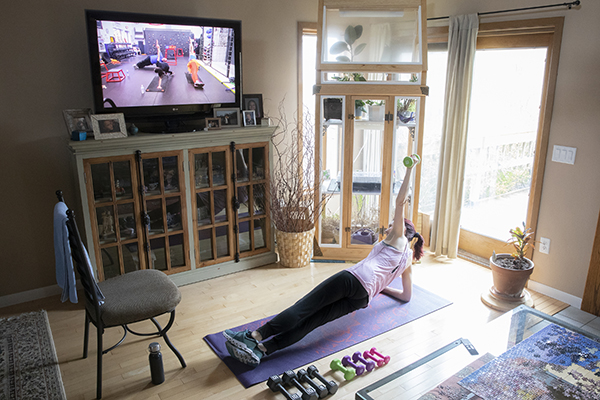Area small businesses get a helping hand
Binghamton University's Small Business Development Center offers free counseling services

Small business owners face uncertainty and difficulty in the best of times, but with the added pressure of a global pandemic, they’re having to adapt in unprecedented ways to support their employees, serve their customers and stay afloat.
The economy is suffering globally, but local businesses can enlist the support of resources like Binghamton University’s Small Business Development Center (SBDC), which provides free, confidential assistance to entrepreneurs and existing owners who are trying to navigate the fast-changing business environment.
“New York SBDCs have been involved in helping small businesses during disasters since our start in 1983,” said Rochelle Layman, regional SBDC director who is based in Binghamton. “Because of our relationships with the Small Business Administration (SBA), New York state and local economic development organizations, we are well placed to assist our local small businesses, with many understandably interested in the Economic Injury Disaster Loan Program and the Paycheck Protection Program. In addition, our relationships with both local and national lenders has been key to assisting our clients in participating in the Payroll Protection Program. To date we have assisted over 500 local businesses with issues relating to COVID 19.”
As a result of New York state’s pause, multiple local restaurants have utilized the center’s services to help guide their switch to delivery- and pickup-only offerings, with one eatery successfully implementing a weekly food club. A local bakery has gained guidance on curbside deliveries and implementing successful marketing strategies. Thinking outside the box, the bakery started a contest to encourage those stuck at home to express themselves through cake decorating, with the best design receiving a gift card to the bakery.
Businesses including salons and gyms have had their traffic cut to zero due to social distancing. Through consultation with SBDC advisors, one local stylist is now producing video tutorials with clients and has had some go viral. Upon advice, a hard-hit gym is now offering virtual exercise classes and is seeing success despite its location being shuttered.
The SBDCs provide free counseling services to small businesses of all types, assisting entrepreneurs and small businesses in problem solving, contributing to local sector growth and community investment. In-house experts meet one-on-one with businesses, providing advice on sales and marketing, managing taxes, forecasting yearly expenses, increasing cash flow and more.
Binghamton University’s SBDC has seen major success year over year, contributing in big ways to the regional economy. In 2019 alone, the Binghamton center worked with 1,027 clients and 159 new business starts, and created or saved 1,463 jobs, said Layman.
While the SBDC still provides help for typical concerns, COVID-19’s effect on area business has changed the center’s focus in a major way. Traffic for Binghamton’s SBDC, which serves 12 counties across the Southern Tier, has surged, with the average number of new clients up 641% since the last week of March, compared to the same period last year. While staff are currently working from their homes, the center has four offices, with its main office located at the Koffman Southern Tier Incubator in Binghamton.
Like the other advisors working for the Binghamton region’s SBDC, Bob Griffin brings years of business experience into his counseling, having worked in marketing for hospitality and food services for over 20 years. According to Griffin, this industry knowledge helps him to support businesses affected by COVID-19.
“The hospitality industry is particularly hard hit, and it is especially difficult for businesses such as restaurants or bars who do not have the infrastructure to pivot effectively,” said Griffin. “Our team has been here to help guide them through survival strategies.”
Binghamton’s SBDC can also help connect businesses located outside of the region to other centers that can provide assistance and can facilitate connections with local agencies and governments. The Binghamton Local Development Corporation, for example, is offering interest-free loans to eligible companies, local chambers of commerce are holding regular webinars and Binghamton’s Koffman business incubator has entrepreneurs in residence available to mentor companies in need.
For Griffin, seeing local businesses band together speaks magnitudes about the resilience of the local economy.
“Our businesses have never seen anything like this,” Griffin said. “We feel the acute pain that they are enduring in every phone call, virtual meeting or email we have with them. We know they can adapt and overcome, and we’re happy to be a trusted resource at the other end of the line, walking alongside them through this unprecedented adversity.”
Binghamton University’s Small Business Development Center provides advising services to 12 counties throughout the Southern Tier. Its Binghamton office can be found at the Southern Tier Startup Incubator, 120 Hawley St., Binghamton. Find out more about Binghamton’s SBDC.

